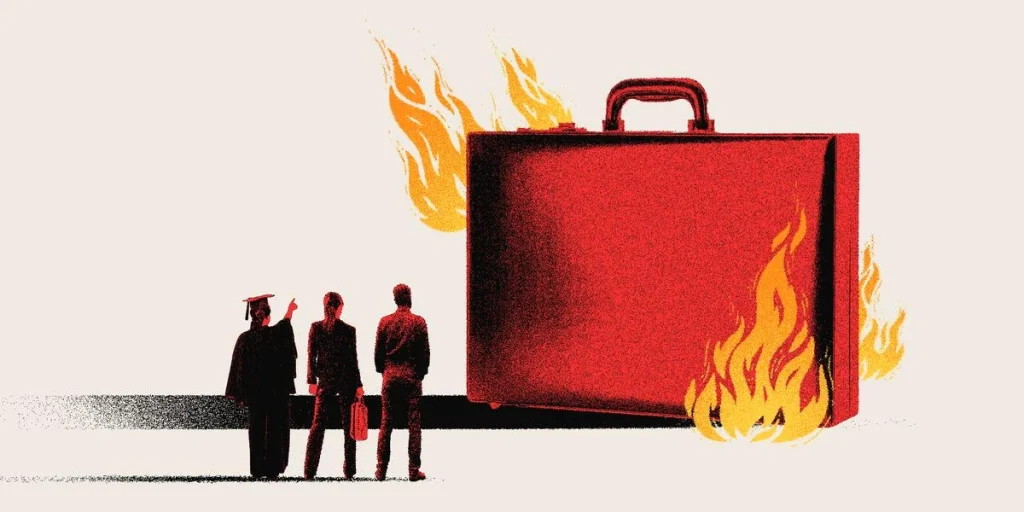Gen Z Faces Career Cliff: Struggling with Fewer Entry-Level Jobs and a Shrinking Path to Success

Gen Z is facing a tough road ahead when it comes to career prospects. With entry-level positions becoming scarce and traditional paths to success narrowing, this generation finds itself in a precarious situation.
Jacqueline Kline, a recent graduate of Florida State University, is an example of the struggles many young people face. Despite her achievements — a full college schedule, internships, and graduating cum laude — Kline found herself applying to hundreds of jobs with little success. “I had this degree, but it didn’t matter. My GPA didn’t matter. None of it mattered if I didn’t have a job,” she says.
For those in their 20s, the job market is tough. Economic concerns and uncertainty, combined with a reluctance to leave current positions, have created a challenging environment for job seekers. Furthermore, new technologies, like AI, are replacing jobs in high-demand fields, including tech. On top of that, public service sectors and nonprofit organizations are facing cuts, leaving fewer options for young graduates who once saw these sectors as stepping stones.
Some are turning to higher education to weather the storm. Kline, for example, has opted to pursue a graduate degree, although many of her peers are facing similar tough choices: continue applying for jobs, return to school, or accept roles outside their field. The traditional career ladder is disappearing, and with it, Gen Z’s hopes for a straightforward ascent.
For many, the disappointment doesn’t end with a degree. Research shows that nearly 41.2% of young graduates are underemployed, working in jobs that typically don’t require a bachelor’s degree. Even Ivy League alumni are feeling the pressure, with job placements for MBA graduates at some of the top programs showing disappointing results.
Bella Babbitt, another Gen Zer, graduated early with dual degrees in business and sociology from a private New York school but struggled to secure a position in her desired field. She spent a year applying to hundreds of jobs, with little luck. “It felt like, ‘This is so stupid, because I know I’m going to get rejected,’” she says, adding that her parents can’t understand why they’re struggling despite their qualifications.
Even in industries like tech, once considered safe for graduates, entry-level jobs are disappearing. Many Gen Zers are being shut out by AI-driven automation and hiring freezes. Positions that once served as stepping stones to better opportunities are also disappearing, with internship postings declining by over 15% in recent years.
The situation is not any easier for those pursuing public service careers. A 21-year-old student from the University of Maryland, who asked to remain anonymous, shared that they lost two promising government jobs due to federal budget cuts. Without a summer job, they’re left reconsidering their future in public service.
For Gen Zers, the uncertainty is deeply unsettling. Historically, young people faced tough job markets, like baby boomers in the 1970s or millennials after the 2008 financial crisis. But what sets Gen Z apart is how educated they are compared to previous generations, yet they are more unemployed than ever.
Economists point out that the root of the problem lies in the current labor market, which doesn’t seem to reflect the economic data. While the unemployment rate is low, many young college graduates are still struggling to find work.
Still, there are some opportunities. Experts like Richard Mansfield believe that sectors like caregiving and healthcare will see a rise in demand as older generations retire. Moreover, as AI continues to evolve, Gen Zers might find new career paths in industries that don’t yet exist.
For now, Kline remains hopeful that her graduate degree will eventually pay off. “I’m reminding myself that it will be worth it. Having this master’s degree will get me further and give me a better chance at a job opportunity,” she says.
But the broader picture is one of a generation grappling with changing market conditions and shifting career expectations. The traditional ladders to success are being replaced by new, uncertain paths. As Isabella Clemmens, 22, explains, “My dream job might exist, but I’m one of 400 people applying for it.”
In the face of these challenges, many Gen Zers are opting for a different approach. Some, like Clemmens, are taking time to explore new cities, network, and reassess their dreams while juggling retail jobs. The job market has become a maze, and young people are finding their way through it, hoping to carve out a future amidst the uncertainty.

